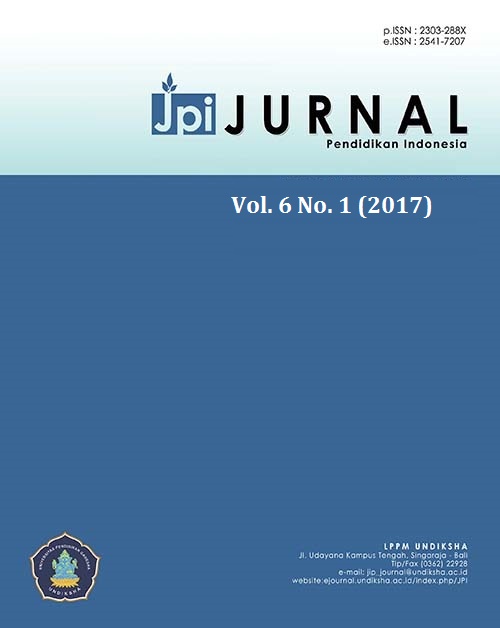KEMAMPUAN BERPIKIR KRITIS DAN KETERAMPILAN PROSES DALAM PEMBELAJARAN SIKLUS BELAJAR 7E BERBASIS KEARIFAN LOKAL
DOI:
https://doi.org/10.23887/jpi-undiksha.v6i1.9476Keywords:
7E learning cycle, local wisdom, critical thinking and process skillsAbstract
The purpose of this study was to determine differences in the ability of critical thinking and process skills among groups of students that learned the 7E learning cycle model based on local wisdom with students that learned kolompok conventional learning models. Significance pembelajran research related to science in primary schools is focused on memorization and rarely train high-level thinking skills of students, making it less in line with the purpose of learning science. The population of as many as 71 people, while the samples used were 58 people. The study design using pretest-posttes Control Group Design. Instrument in this research is to test the ability of critical thinking, and process skills test students. Data were analyzed by using MANOVA. The results showed there were differences in the ability of critical thinking and process skills significantly between students that learned with the learning cycle model 7E based on local wisdom and that learned to conventional models.
References
Cabrera, G. A. (1992). A Framework For Evaluating the Teching of Critical Thinking. Dalam R.N. Cassel (ed). Education. 113(1) 59-63
Costa, A.L. (Ed). Developing Minds A Resource Book for Teaching Thinking. Alexandra, Virginia: Assosiation for Supervisions and Curriculum Development (ASCD): 87-89
Eisenkraft, A. 2003. The Science Teacher: Expanding the 5E Model. Arlington:National Science teacher Association.
Ennis, R.H. 1985. Goals for A Critical Thiking Curriculum. Costa, A.L. (Ed). Developing Minds A Resource Book for Teaching Thinking. Alexandra, Virginia: Assosiation for Supervisions and Curriculum Development (ASCD): 54-57.
Hudoyo, H. 2008. Metode Teknik dan Strategi dalam Belajar. Bandung: Tarsito.
Jonson, Elaine B. 2010. Contextual Teaching and Learning: Menjadikan Belajar Mengajar Mengasikkan dan Bermakna. Bandung: Kaifa Learning.
Soetarno.2004. Ragam Budaya Indonesia. Direktorat Pembinaan Pendidik Tenaga Pendidikan dan Ketenagaan Perguruan Tinggi. Jakarta: Dirjen Dikti.
Sornsakda, S., Suksringarm, P. and Singseewo, A. 2009. Effects of Learning Environmental Education Using The 7E-Learning Cycle with Metacognitive Techniques and Teacher’s Handbook Approaches on Learning Achievement, Integrated Science Process Skills and Critical Thinking of Mathayomsuksa 5 Students with Different Learning Achievement. Pakistan Journal of Social Sciences. 6(5): 297-303.
Sudiana, I Made. Sudirgayasa I Gede. 2015. Jurnal Kajian Bali. 5(1). 181-200.
Downloads
Published
Issue
Section
License
Authors who publish with the Jurnal Pendidikan Indnesia agree to the following terms:
- Authors retain copyright and grant the journal the right of first publication with the work simultaneously licensed under a Creative Commons Attribution License (CC BY-SA 4.0) that allows others to share the work with an acknowledgment of the work's authorship and initial publication in this journal.
- Authors are able to enter into separate, additional contractual arrangements for the non-exclusive distribution of the journal's published version of the work (e.g., post it to an institutional repository or publish it in a book), with an acknowledgment of its initial publication in this journal.
- Authors are permitted and encouraged to post their work online (e.g., in institutional repositories or on their website) prior to and during the submission process, as it can lead to productive exchanges, as well as earlier and greater citation of published work. (See The Effect of Open Access)








